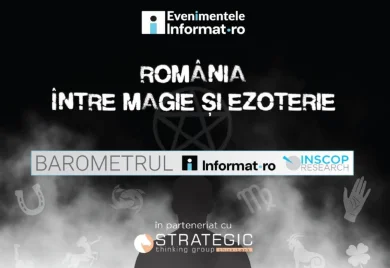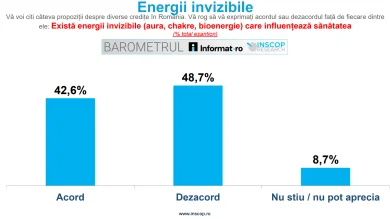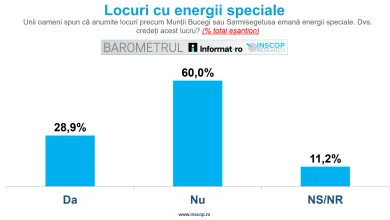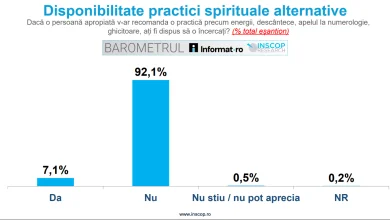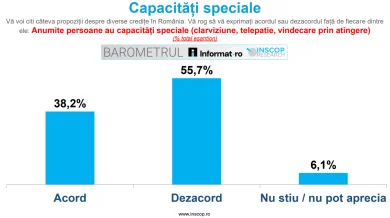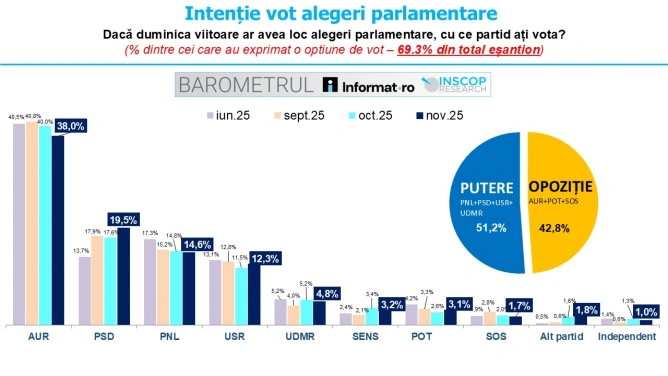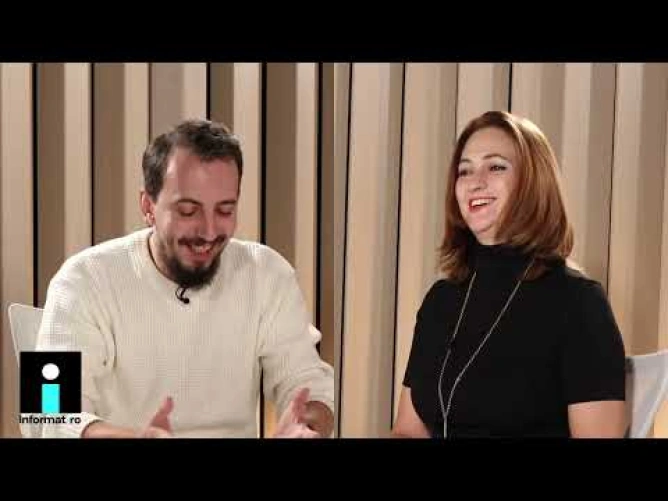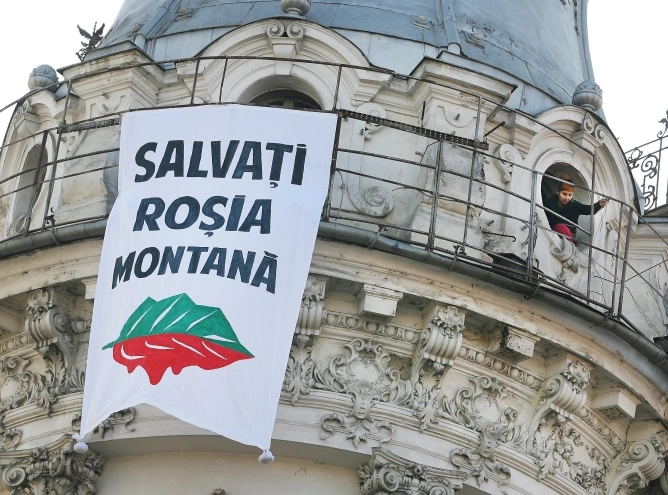.webp)
Launch of the Barometer Informat.ro – INSCOP: "Romania Between Magic and Esotericism"
The full study will be presented on October 20, 2025, during an event organized at the Romanian Peasant Museum
According to Barometer Informat.ro – INSCOP "Romania Between Magic and Esotericism"", 51.4% of Romanians agree with the statement that there are "energetically charged" places in Romania that influence people's well-being. 37.8% express their disagreement with this idea, while 10.9% declare that they do not know or cannot assess.
These are just a few of the data extracted from Barometer Informat.ro – INSCOP: "Romania Between Magic and Esotericism", a comprehensive sociological research that will be fully launched during an event organized in partnership with the Romanian Peasant Museum on October 20, 2025.
Remus Ștefureac, director of INSCOP Research: "The first conclusions of the study are completely unexpected. The belief in the existence of "energetically charged" places crosses all social categories, without significant differences between women and men. This uniformity suggests that the phenomenon has a general cultural resonance, transcending gender barriers. Surprisingly, even the level of education does not produce clear polarizations in attitudes, as individuals with higher education resonate similarly to the rest of the population with secondary or primary education. This aspect suggests that the idea of "energetically charged" places transcends the boundaries between rational and subjective thinking. Somewhat counterintuitively, age introduces an unexpected dynamic, with younger people being more receptive to the idea of the existence of "energetically charged" places compared to those over 60. The data suggest a generational shift in perception, where new generations, exposed to a mix of spirituality, alternative culture, and distorted influences from media and social media, reinterpret the symbolic dimension of reality outside the established benchmarks of rationality. Finally, the residential environment differentiates perceptions in a way contrary to expectations: urban residents – including those from Bucharest – are more likely than those from rural areas to believe in the existence of "energetically charged" places. This trend suggests that such beliefs are no longer predominantly fueled by rural tradition, but by a form of diffuse spirituality that coexists with urban modernity."
By voting preference, the values are distributed as follows: among PSD voters, 58% agree with the statement that there are "energetically charged" places in Romania that influence people's well-being and 28% disagree; among PNL voters, 49% agree and 44% disagree; among AUR voters, 55% agree and 35% disagree; for USR voters, agreement is at 40%, while disagreement is at 48%.
Among men, 52% agree that there are "energetically charged" places that influence people's well-being, while 39% disagree. Among women, 51% agree and 37% disagree.
In the age category 18–29 years, 61% of respondents agree and 35% disagree. For the group 30–44 years, agreement is at 49%, and disagreement at 39%. Among those aged 45–59, 53% agree, 39% disagree. In the category 60 years and over, agreement is at 47%, and disagreement at 36%.
By education level, individuals with primary education record an agreement level of 49%, and disagreement of 38%. Those with secondary education report 53% agreement and 37% disagreement. Respondents with higher education present 51% agreement and 40% disagreement.
By residential environment, among residents of Bucharest, agreement is high, reaching 55%, while disagreement is at 39%. In large cities with over 90,000 inhabitants, agreement is at 55%, and disagreement at 36%. In medium and small cities with under 90,000 inhabitants, agreement is reported by 58%, and disagreement by 34% of respondents. In rural areas, 45% agree, while disagreement is reported by 40% of respondents.
Graphical presentation of the data is available here: Barometer Informat.ro – INSCOP: "Romania Between Magic and Esotericism"
The full study will be launched during an event organized on October 20, at 11 AM, at the Romanian Peasant Museum, Media Hall.
The presentation of the sociological research will be followed by a debate featuring Andrei PLEȘU, philosopher, President of the New Europe College, Vasile BĂNESCU, CNA member, Vlad Petreanu, journalist, Camelia BURGHELE, anthropologist, and Virgil NIȚULESCU, director of the Romanian Peasant Museum.
The themes addressed in the sociological study outline an unexpected portrait of today's Romania, impacting personal, social relationships, or even voting decisions. The sociological study questions the level of personal superstition, beliefs related to luck and misfortune, magical-religious and spiritual practices, belief in energies and paranormal phenomena, attitudes towards conspiracies, the relationship between science and belief, and perceptions of alternative medicine.
